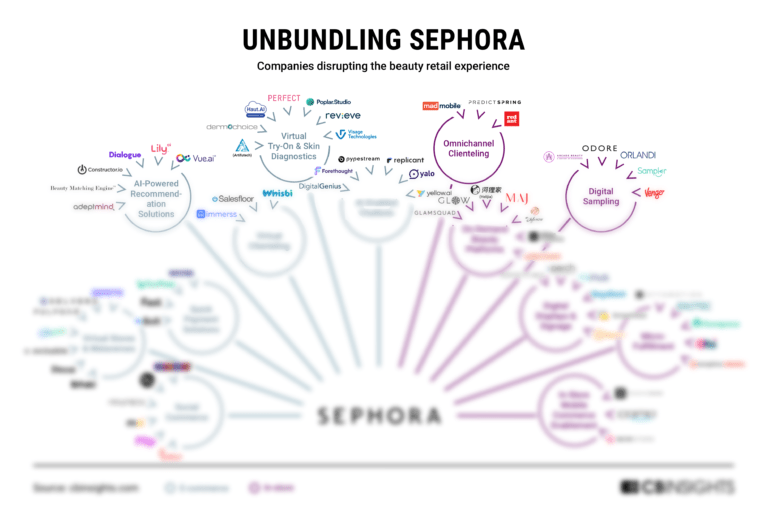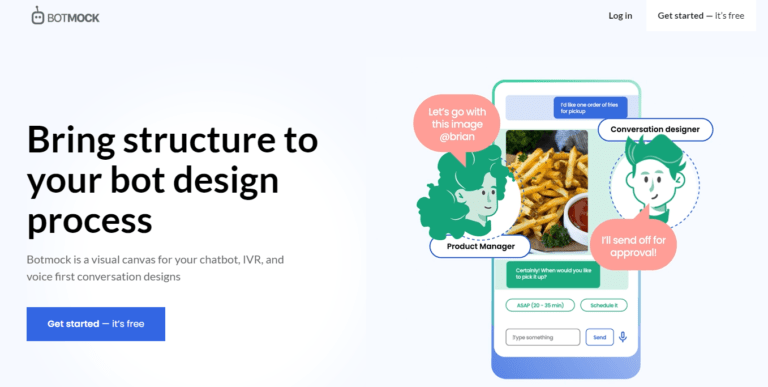
Pypestream
Founded Year
2015Stage
Unattributed - V | AliveTotal Raised
$52.55MLast Raised
$5M | 4 yrs agoRevenue
$0000Mosaic Score The Mosaic Score is an algorithm that measures the overall financial health and market potential of private companies.
-40 points in the past 30 days
About Pypestream
Pypestream specializes in AI-powered customer experience automation within various business sectors, including insurance, telecommunications, retail, and more. The company offers an omnichannel platform that leverages conversational AI to provide personalized, efficient customer service and support through a library of microapps. Pypestream's solutions are primarily utilized by industries such as insurance, telecommunications, retail, quick service restaurants, travel, hospitality, and real estate. It was founded in 2015 and is based in New York, New York.
Loading...
Pypestream's Products & Differentiators
Pypestream Pype
Front-end messaging interface that can be placed on a webpage or within an app for customer engagement
Loading...
Research containing Pypestream
Get data-driven expert analysis from the CB Insights Intelligence Unit.
CB Insights Intelligence Analysts have mentioned Pypestream in 2 CB Insights research briefs, most recently on Jan 31, 2022.
Expert Collections containing Pypestream
Expert Collections are analyst-curated lists that highlight the companies you need to know in the most important technology spaces.
Pypestream is included in 4 Expert Collections, including Insurtech.
Insurtech
4,354 items
Companies and startups that use technology to improve core and ancillary insurance operations. Companies in this collection are creating new product architectures, improving underwriting models, accelerating claims and creating a better customer experience
Artificial Intelligence
14,767 items
Companies developing artificial intelligence solutions, including cross-industry applications, industry-specific products, and AI infrastructure solutions.
Fintech
9,297 items
Companies and startups in this collection provide technology to streamline, improve, and transform financial services, products, and operations for individuals and businesses.
Sales & Customer Service Tech
1,037 items
Companies offering technology-driven solutions for brands and retailers to enable customer service before, during, and after in-store and online shopping.
Pypestream Patents
Pypestream has filed 11 patents.
The 3 most popular patent topics include:
- artificial neural networks
- classification algorithms
- machine learning

Application Date | Grant Date | Title | Related Topics | Status |
|---|---|---|---|---|
12/15/2022 | 7/9/2024 | Classification algorithms, Machine learning, Natural language processing, Statistical classification, Artificial neural networks | Grant |
Application Date | 12/15/2022 |
|---|---|
Grant Date | 7/9/2024 |
Title | |
Related Topics | Classification algorithms, Machine learning, Natural language processing, Statistical classification, Artificial neural networks |
Status | Grant |
Latest Pypestream News
Jul 29, 2024
News provided by Share this article Share toX NEW YORK, July 29, 2024 /PRNewswire/ -- The global conversational computing platform market size is estimated to grow by USD 35.64 billion from 2024-2028, according to Technavio. The market is estimated to grow at a CAGR of 55.15% during the forecast period. Reduction in time and cost required to develop conversational computing platforms is driving market growth, with a trend towards use of ai in conversational computing platforms. However, issues associated with data privacy poses a challenge. Key market players include Alphabet Inc., Amazon.com Inc., Amelia US LLC, Artificial Solutions International AB, Creative Virtual Ltd., Eudata, Inbenta Holdings Inc., International Business Machines Corp., Jio Haptik Technologies Ltd., Kore.ai Inc., Liveperson Inc., Meta Platforms Inc., Microsoft Corp., onereach.ai, Oracle Corp., Pypestream Inc., Rasa Technologies Inc., Rulai, Salesforce Inc., and SmarTek21 LLC. Technavio has announced its latest market research report titled Global conversational computing platform market 2024-2028 Forecast period Segment Covered Type (Virtual digital assistants and Chatbots) and Geography (North America, APAC, Europe, South America, and Middle East and Africa) Region Covered Key companies profiled Alphabet Inc., Amazon.com Inc., Amelia US LLC, Artificial Solutions International AB, Creative Virtual Ltd., Eudata, Inbenta Holdings Inc., International Business Machines Corp., Jio Haptik Technologies Ltd., Kore.ai Inc., Liveperson Inc., Meta Platforms Inc., Microsoft Corp., onereach.ai, Oracle Corp., Pypestream Inc., Rasa Technologies Inc., Rulai, Salesforce Inc., and SmarTek21 LLC Key Market Trends Fueling Growth Conversational computing platforms have evolved from handling basic customer queries to executing complex tasks, thanks to advancements in AI and machine learning. AI algorithms analyze customer conversations to determine their needs and take appropriate actions. Sentiment analysis helps understand customer moods, while real-time analytics enables quick human intervention when necessary. Chatbots use natural language processing (NLP) to summarize key information, assisting with product queries and technical support. An example is Woebot, a chatbot using AI technologies for mental health support, implementing cognitive behavioral therapy and dialectical behavior therapy techniques. Woebot, created by Stanford University experts, sends over a million messages weekly to help users cope with depression, anxiety, or loneliness. The Conversational Computing Platform market is experiencing significant growth as businesses adopt chatbots, text assistants, and voice assistants for advertising, customer service, and internal enterprise systems. Natural language processing (NLP), machine learning (ML), and deep learning are key technologies driving this trend. Cloud-based solutions are popular due to their flexibility and scalability. Telecom, entertainment and media, travel and hospitality, IT and telecom, and startups are major industries investing in conversational AI and generative AI. NLP and ML enable voice recognition technologies for AI chatbots on messaging services and platforms. Customer bases are expanding as these technologies improve digital transformation, remote work, and IT department efficiency. Big Data, IoTs, Blockchain, and bi data analytics are also integrating with conversational computing platforms for enhanced capabilities. Discover 360° analysis of this market. For complete information, schedule your consultation- Book Here! Market Challenges Conversational computing platforms, which include chatbots and virtual digital assistants, offer valuable insights for businesses by identifying search and buying patterns, consumer behavior, and more. However, data privacy is a significant concern for users. These platforms learn and improve through feedback and behavioral data, but the collection and use of personal information raises privacy and security concerns. Regulations like the GDPR limit data collection and usage, and some conversational computing platforms provide data ownership to customers. However, not all vendors offer this flexibility, and users may not fully understand the data being shared and third-party policies. Compliance with regulations, such as GDPR, is crucial, but some platforms offer workarounds to generate insights while adhering to regulations. Overall, addressing privacy concerns is essential for the growth of the conversational computing market. The Conversational Computing Platform market is witnessing significant growth due to the increasing demand for AI-driven solutions that enhance customer engagement and automate business processes. IT and telecom industries are leading the way, integrating Conversational AI, Generative AI, Computer vision, and Voice recognition technology into their offerings. Messaging services and platforms are also adopting conversational computing solutions to provide more personalized customer service. However, challenges persist. Integrating conversational computing with internal enterprise systems and remote work environments requires IT departments to adapt. Natural Language Interfaces, NLP, ML, and Voice recognition technologies pose challenges in understanding complex queries and providing accurate responses. Big Data, IoTs, Blockchain, Bi data analytics, and AI-based technology require robust conversational techniques for effective information dissemination. Digital Marketing managers seek AI-driven conversational techniques for automated customer queries, insurance quotes, and claims inquiries. Healthcare and other industries also benefit from conversational computing, improving customer satisfaction and streamlining business processes. Segment Overview Type 2.5 Middle East and Africa 1.1 Virtual digital assistants- The Conversational Computing Platform market is experiencing significant growth as businesses seek to enhance customer engagement and streamline operations. These platforms enable natural language processing, allowing for human-like interactions between users and machines. Companies can build chatbots and voice assistants to handle customer queries, automate workflows, and gather valuable data. This technology is transforming industries, from retail and finance to healthcare and education. By integrating conversational computing into their strategies, businesses can improve customer satisfaction, reduce response times, and gain a competitive edge. For more information on market segmentation with geographical analysis including forecast (2024-2028) and historic data (2018 - 2022) - Download a Sample Report Learn and explore more about Technavio's in-depth research reports The global Cloud AI market is projected to reach $122 billion by 2028, driven by increasing adoption of AI-powered services across industries. Cloud AI solutions offer scalable, cost-effective data processing and advanced analytics. Meanwhile, the Edge Computing market is expected to hit $80 billion by 2027, fueled by the demand for real-time data processing and reduced latency. Edge computing complements Cloud AI by enabling faster decision-making at the data source, enhancing overall system efficiency and performance. Both markets are experiencing rapid growth due to technological advancements and rising enterprise needs. Research Analysis Conversational computing solutions have revolutionized the way businesses interact with their customers and automate business processes. These technologies, which include speech synthesis and recognition, natural language understanding, and neural networks, enable AI-based systems to understand and respond to customer queries, provide insurance quotes and claims inquiries, and even offer healthcare consultations. Automated conversational techniques, such as chatbots and conversational AI, have become essential tools for digital marketing managers to enhance customer satisfaction and engagement. Generative AI and computer vision are also being integrated into conversational computing platforms to provide more personalized and visual experiences. Voice recognition technology and AI chatbots are transforming messaging services and platforms, making customer service more efficient and effective. Overall, conversational computing is a rapidly growing market that offers significant benefits for businesses and consumers alike. Market Research Overview Conversational computing solutions are revolutionizing the way businesses interact with their customers and internal systems. Speech synthesis and speech recognition, powered by neural networks and natural language understanding, enable automated conversational techniques for handling customer queries, providing insurance quotes, and managing claims inquiries. These technologies are not limited to customer service but also extend to healthcare, digital marketing, advertising, and more. AI-based technology, including natural language processing, machine learning, and deep learning, plays a crucial role in understanding and responding to customer needs. Conversational AI, generative AI, computer vision, and voice recognition technologies are transforming industries such as telecom, entertainment and media, travel and hospitality, and startups. Consulting and training, support and maintenance, cloud services, and IT departments are essential for implementing and optimizing conversational computing solutions. Remote work and internal enterprise systems are also benefiting from these advanced technologies. Big Data, IoTs, Blockchain, and Bi data analytics are integral to enhancing the capabilities of conversational computing platforms. Table of Contents: About Technavio Technavio is a leading global technology research and advisory company. Their research and analysis focuses on emerging market trends and provides actionable insights to help businesses identify market opportunities and develop effective strategies to optimize their market positions. With over 500 specialized analysts, Technavio's report library consists of more than 17,000 reports and counting, covering 800 technologies, spanning across 50 countries. Their client base consists of enterprises of all sizes, including more than 100 Fortune 500 companies. This growing client base relies on Technavio's comprehensive coverage, extensive research, and actionable market insights to identify opportunities in existing and potential markets and assess their competitive positions within changing market scenarios. Contacts
Pypestream Frequently Asked Questions (FAQ)
When was Pypestream founded?
Pypestream was founded in 2015.
Where is Pypestream's headquarters?
Pypestream's headquarters is located at 1177 Avenue of the Americas, New York.
What is Pypestream's latest funding round?
Pypestream's latest funding round is Unattributed - V.
How much did Pypestream raise?
Pypestream raised a total of $52.55M.
Who are the investors of Pypestream?
Investors of Pypestream include Paycheck Protection Program, W.R. Berkley, Plug and Play APAC, Plug and Play Insurtech, Rick Braddock and 12 more.
Who are Pypestream's competitors?
Competitors of Pypestream include Spixii, Enterprise Bot, Rasa, Drift, Kore.ai and 7 more.
What products does Pypestream offer?
Pypestream's products include Pypestream Pype and 4 more.
Who are Pypestream's customers?
Customers of Pypestream include SlingTV, Gillette, Gulf Air and Related Rentals.
Loading...
Compare Pypestream to Competitors

Inbenta specializes in conversational AI and automation within the customer service sector. The company offers a suite of products including AI-enabled chatbots, search tools, and knowledge management systems designed to enhance customer experience and streamline service operations. Inbenta's conversational AI platform is utilized across various industries to automate customer interactions, provide self-service options, and improve overall customer satisfaction. It was founded in 2005 and is based in Sunnyvale, California.

Rasa focuses on providing enterprise-grade for business sectors. The company offers a suite of products that enable personalized and scalable customer interactions through text- and voice-based AI. Rasa's solutions cater to industries such as financial services, healthcare, telecom, and travel and transport. Rasa was formerly known as LastMile Technologies. It was founded in 2016 and is based in San Francisco, California.

Ada is a company specializing in AI-powered customer service automation within various business sectors. The company offers a platform that enables enterprises to resolve customer inquiries efficiently across multiple channels and languages, without the need for extensive human intervention. Ada's solutions cater to industries such as ecommerce, FinTech, SaaS, and gaming. It was founded in 2016 and is based in Toronto, Ontario.

Yellow.ai develops conversational artificial intelligence (AI) operating in the technology and artificial intelligence domain. The company offers a dynamic automation platform (DAP) that uses generative AI to automate and personalize customer support, commerce, and employee experiences. It primarily serves sectors such as banking, healthcare, utilities, and retail. Yellow.ai was formerly known as Yellow Messenger. The company was founded in 2016 and is based in San Mateo, California.

ProNavigator is a company that focuses on knowledge management in the insurance industry. The company offers an AI-driven platform that helps insurance organizations capture, organize, and scale their knowledge, enabling staff to quickly and accurately find answers to their questions and ensuring the consistency and control of content. ProNavigator primarily serves the insurance industry. It was founded in 2016 and is based in Kitchener, Ontario.
Spixii specializes in conversational process automation (CPA) within the insurance industry. The platform offers self-service capabilities, enabling businesses to automate high-value processes and integrate with core systems for service delivery. Its solutions are designed to enhance operational productivity and customer experience through expert chatbots, business process modeling, and real-time analytics. Spixii was formerly known as Safer. It was founded in 2016 and is based in London, United Kingdom.
Loading...

